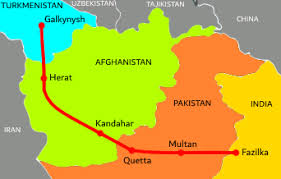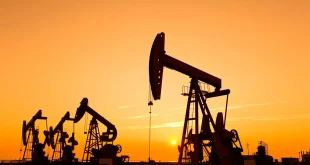The long-awaited mega gas pipeline project of Turkmenistan, Afghanistan, Pakistan and India (TAPI) connecting the energy-rich Central Asian nation with the South Asian countries was inaugurated couple of days ago, with leaders of the four countries attending its groundbreaking ceremony in Serhetabat followed by another in Herat.
Considering the facts on the ground including political differences of the involved countries in the project and also insecurity and instability in the region many experts believe the successful realization of the project will depend on the ability of the project participants to maneuver through among others geopolitical, financial and technical challenges.
To discuss the issue, we reached out to Omid Shokri Kalehsar, Senior Energy Security Analyst in Washington.
Following is the full text of interview with him:
Considering the differences between India and Pakistan and instability and insecurity in Afghanistan and Pakistan, how successful do you see the future of this project?
The 1,814-kilometer gas pipeline will pass through Afghanistan to Pakistan and India. At least 816 kilometers of the pipeline will pass through the territory of Afghanistan. Transport or transit security is an important part of pipeline project beside of security of supply and demand security, financial guarantee and financial sources are another key factors in any pipeline project.
The Turkmen economy has been fueled primarily by natural gas. Turkmenistan holds 32 trillion cubic meters of natural gas, the world’s fourth-largest reserves. With a small domestic market, Turkmenistan has been able to export the majority of what it produces. With regard to increasing energy demand in India, this country needs diversify energy supply, gas resources in Central Asia especially in Turkmenistan would be one of these resources. This project also would be beneficial for both Pakistan as consumer and transit country and for India as importer. There is a political tension in India and Pakistan relations and maybe TAPI would have positive effect of regional cooperation, stability and security. TAPI may be key factor in India- Pakistan relations to decrease tensions and develop bilateral relations. TAPI natural gas pipeline -which aims to connect Central Asian energy to South Asian consumers -each involve a high degree of intra-regional cooperation. Pakistan will gain transit fee from this project and also will consume natural gas imported by it.
How can this project affect the economy and security of the region particularly Afghanistan?
According to contract, Afghanistan will import gas via this project to meet it domestic demand and will gain $400000 to $500000 annually transit fee. This will help Afghanistan to gain more and partly recover its damaged economy. TAPI project will help Afghanistan to be an actor in regional energy market. The pipeline will pass through the provinces of Herat, Farah, Nimroz, Helmand and Kandahar. Taliban control these provinces. In statement which Taliban sent to local media, this group declared that they will not allow any group or state to disrupt this project. As Taliban controls this region, security threats against TAPI project in this part of Afghanistan will decrease and security concern will down.
Why does Saudi Arabia support the project?
These countries hold major oil reserves in the region and are trying to play an important role in OPEC and world energy market as well. Current tensions in bilateral relation forced countries to use any means to decrease counterpart role in regional security stability. Saudi Arabia has expressed support for the TAPI transnational gas pipeline. Saudi’s financial support for TAPI would help Pakistan not to need Iranian gas. And it means that Iran will lose Pakistan natural gas market if TAPI materialize project. Last decade India was interested to buy Iran natural gas via Peace Pipeline, but due to US pressure this project did not materialize. It seems that when TAPI comes to online, India no more will be interested to Iran natural gas. Pakistan and Afghanistan are Iran electricity buyer, during inaugural ceremony Pakistan and Turkmenistan agreed to export electricity from Turkmenistan to Pakistan and maybe in near future if this electricity export project materialize, Pakistan decrease electricity volume which imported from Iran.
What are the challenges and opportunities of the project for Iran?
Iran has plans to export natural gas to its neighbors, according to Iran 20 years development plan, Iran has to increase its share from world natural gas to %10. Iran signed agreement with Pakistan, Oman, and Iraq to export gas. At present only Iran-Iraq pipeline near to officially open. Pakistan is planning to import more LNG from Qatar, and last week Russian giant Gazprom announced that it is considering the potential of delivering liquefied natural gas (LNG) supplies to Pakistan by October 2017, Pakistan and Russia signed an intergovernmental cooperation agreement for the delivery of liquefied natural gas in October last year. Pakistan currently has two LNG import terminals in operation in Karachi, however, with a total capacity of around 9.5 mtpa, a significant supply shortfall of 19 million tons of LNG per annum is still expected. It seems that if TAPI will be successful and Pakistan import more LNG from Qatar and Russia there is no more need for Iran natural gas and Iran-Pakistan pipeline.
How do you evaluate Iran’s energy diplomacy?
Energy diplomacy is a reaction to geopolitical threats and limits. In other words, using diplomatic mobility, economic planning, developing technical capacities and using economic resources to provide all conditions required for activating energy diplomacy. Iran’s share in the world energy market is insignificant. Iran could play a more active role in the world energy market, and mobility in production, export, marketing, exploration and extraction in the energy sector could create a special position for every country. Iran must be more active in foreign diplomacy to eliminate problems with its neighbors.
Interview by Payman Yazdani





